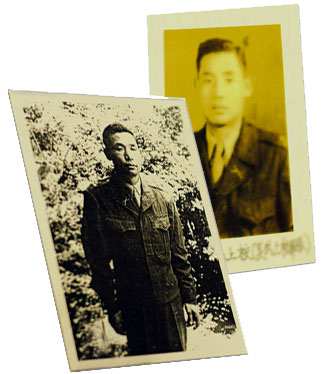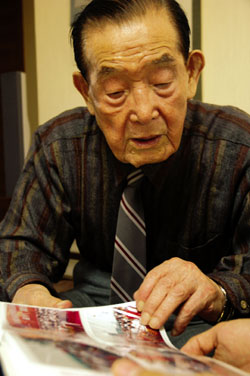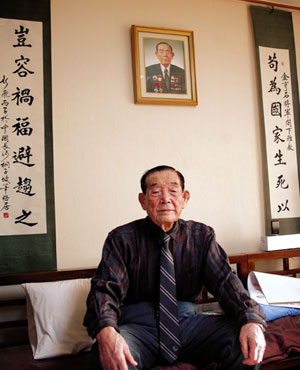 | ||
War against Japan
Farmers, students, and nobles organized armies and fought to the last against the Japanese, crying for Korea's independence. In spite of Japanese killings, Koreans never stopped striving to achieve lawful independence from Japan. The more Koreans tried to fight, the more Japan strengthened her armies. As a result, many young Korean men moved to China and made resistance groups. Some of them such as Yoon Bong-gil and Ahn Joong-geun carried the goal of assasinating the infamous people from Japan. They were terrorists, but terrorists for Korea's independence. Others such as Ahn Chang-ho devoted their lives to strengthen Korea's unique national education because Japan tried to delete Korean national spirit. Many less well known patriots also died for Korea.
Expelled heroes 
▲ Kim Hyung-suk points to his pictures of the Chinese Independence Ceremony for National heroes.
On Aug. 15 1945, the day many people longed for finally came. World War II was over and Japan? imperialism down, but unfortunately the independence was led by American missiles, not by Korean anti-Japan armies. At that time, Kim Koo had already organized a strong Korean army. Before Korea achieved independence by herself, outside forces completed the task. Soon pro-Japanese Koreans occupied authority again because they became pro-American. They continued to maintain their vested right and expelled the patriots from Korea.
Devaluation
Patriots have been devaluated until now. Kim Hyung-suk (95, Korean National Foundation Decoration for Protecting the Country Against the Japanese Invasion) was one of the deputy generals of the Chinese anti-Japanese armies and he was the Chief General of the Korean anti-Japanese army. He participated in hundreds of battles against Japan. Above all, he led the Dae Jeon-ja Battle to its great victory in 1933. General Kim helped Jang Gae-suk (President of Democratic China, today's Taiwan) declare Korean independence from Japan in the Cairo Declaration. Kim led the Korean independence but had to live as a Chinese in China. He stayed in China as a professor at Peking Univ. for 30 years. He was even elected one of the 70 Chinese anti-Japanese heroes. In Korea, however, he was only given the 4th level of national patriots. He had been ignored for about 90 years.
Unkind treatment
"General Kim Kyu-myun is another case," says Kim Seong-ho (Author of To find the spirit of missed continent). General Kim was the Chief General of Korean Sin Min-dang (The famous Korean independence armies). He gained victory against the Japanese in the Great Bong Oh-dong Battle. "Now General Kim is buried in Novodevichii monastery (The national cemetery of Russia). The Soviet Union admired his life and mind and recognized General Kim a Korean hero against the Japanese,"states Kim. He also couldn't come back to Korea and had to live meagerly in Moscow missing his country. Finally he drew his last breath in the Soviet Union without any support from Korea. Korean anti-Japanese heroes are still being neglected by their country.
The unfair structure 
▲ The Korean hero sits in front of memorials of the Independence.
"Many patriots couldn't receive the right evaluations from their home country because pro-Japanese infiltrated the authorities again. Pro-Japanese could gain riches and honors while many patriots fell in danger out of Korean peninsula," says General Kim. After Korean independence, pro-Japanese stood in the main center of authority through American support, while patriots had to live poor and difficult lives again. In addition, this unfair structure has been maintained until today. Sons of pro-Japanese caught the fathers' status and won the lawsuit of betrayers' land. General Kim adds, "Because betrayers gained a lot of vested rights and chances, unfair structure can be maintained. To break down this unfairness, the Korean government and citizens have to find achievements of patriots and evaluate them properly."
The first step to clear up history
"China has tried to find the hidden heroes and has supported them. Even though I'm not Chinese, China treated me as a hero. This is an effort to build the strong Chinese history. But Korea hasn't taken part of this effort," says General Kim. In 2005, China selected 70 generals who fought greatly against Japan to remember the 60th anniversary of the defeat of Japan. China built a great wall at the Peace Square . On the wall, 70 generals' hand prints are visible. One of them is General Kim's. China tried to clarify their history and emphasize their historical status. Korea also has to make Korean history clear. The first step is to find the patriots and evaluate them correctly.
These days Korea appears to exist among conspiracies. Neighbor countries try to distort Korean history and even question the ownership of the Korean Peninsula. In this situation, it is an important duty to build the right history and emphasize fair and honest historical evaluation. To protect Korea from other enemies, we must protect our history first. Without history, a country cannot exist. Like in the 1940s, we have to become modern patriots. To find the past patriots' achievements and evaluate them is the first step to make perfect independence a reality.
* Photographed by Chai Kyu-min

